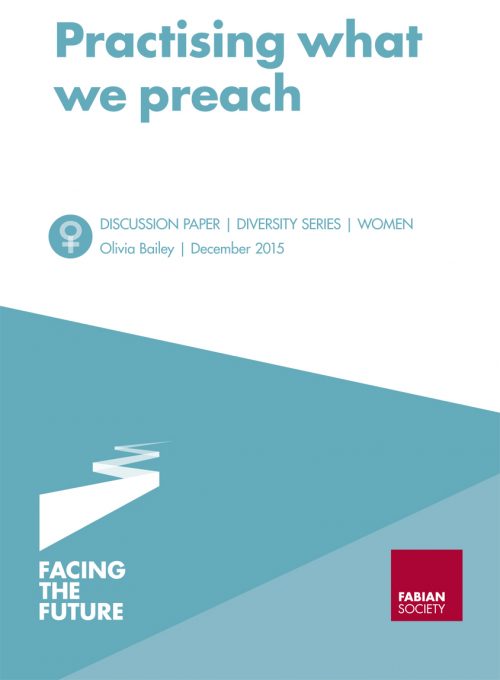Practising What We Preach: Women and the Labour party
The first of a new diversity series looks at what Labour needs to do to improve the representation of women.

- Practising What We Preach
- Olivia Bailey
- 15 December 2015
“Women are very poorly represented at all levels of the Labour Party, particularly at the top. Why then, when the principle of equality is at the very centre of socialism, has the Labour Party failed so dismally to practice what it preaches?”
Quotas now: women in the Labour Party’, Fabian Tract 541, 1990
These words have the same resonance now as they did 25 years ago. Women in the Labour party are still under-represented, particularly at the top. Although women make up 44 per cent of Labour’s membership and 43 per cent of Labour’s MPs, where positive action is not used women’s representation falls away. Women make up just 30 per cent of CLP chairs, 16 per cent of Labour council leaders, 11 per cent of the most senior Labour party staff and 0 per cent of Labour’s leadership team. While all women shortlists and gender quotas have made an important difference, the party still has a long way to go if it wants to practice what it preaches on women’s equality.
Using the findings from a ground-breaking survey of over 3000 Labour party members, new Fabian Report ‘Practising What We Preach’ reveals that women in the Labour Party are still facing a range of barriers when the put themselves forward for selection. One third of women who said they’ve stood for a national or regional selection said that they’d faced unwelcome scrutiny of their private lives, compared to just 11% of men. Half said they couldn’t afford what they needed to campaign, compared to 27% of men. Just 44% of women said they felt the process was transparent. The report also reveals that women are much less likely than men to put themselves forward for selection, our survey showing them to be 14 percentage points less likely than men to say they want to stand.[1]
Setting out a range of steps the party could take to improve the representation of women, Practising What We Preach argues that the party must make gender equality an organisational priority in order to prevent the ‘new politics’ looking exactly like the old. We suggest a range of changes to the rulebook, including a new rule on gender balance in leadership roles, including the leader and deputy, and a standardised target for 50:50 at every level of the Party. We suggest a new focus on training and development, with equality and diversity training for local parties and leadership training for women who have already been elected. And, we also suggest greater efforts to improve transparency – to help potential candidates understand what they need to do, and also to better make the case for positive action to party members.
Practising What We Preach aims to start a debate in the Labour party, rather than proposing definitive solutions. Posing a series of discussion questions, it asks Labour members and supporters to discuss the issues it raises, and submit their thoughts ahead of a final report in the summer of 2016.
Click here to read the full report, and access the data tables here. You can submit your ideas by emailing representation@fabians.org.uk.
ABOUT THE SERIES
This is the first of five discussion papers the Fabian Society will publish as part of a new series on representation. The other four papers will cover sexuality, race, disability and class. The objective of the project is to make practical recommendations to the Labour party about how it can better reflect the country it seeks to represent by improving the diversity of its representatives, from officers in local parties through to parliamentarians.
[1] for parliament or a different national or regional selection
Author
Fabian membership
Join the Fabian Society today and help shape the future of the left
You’ll receive the quarterly Fabian Review and at least four reports or pamphlets each year sent to your door
Be a part of the debate at Fabian conferences and events and join one of our network of local Fabian societies
Join the Fabian SocietyBe the first to know
Sign up to the free Fabian Society newsletter
Find out about the latest Fabian Society research, publications and events with our regular updates
Sign up today